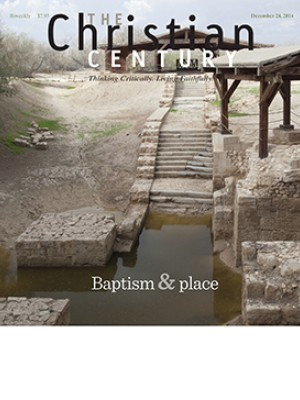Epiphany of the Lord: Matthew 2:1-12
The Magi's alien exoticism is an intrinsic part of Matthew's story.
American Bandstand and I came of age together. As I was entering my teens, Dick Clark’s television rock ’n’ roll dance party was cresting in popularity. Like many of my classmates, most days I would postpone algebra homework after school to watch Philadelphia’s youth bopping to the tunes of Danny and the Juniors, Lavern Baker, Dion and the Belmonts, and Gene Vincent.
At its peak, Bandstand drew more than 20 million viewers, and it was assumed that the audience was so large because of an expansive and shared youth culture. We teenagers, in other words, simply wanted to see people like us doing on national television what we liked to do ourselves at sock hops in the school gym.
Read our latest issue or browse back issues.
Well, maybe for some, but not for me. I was an anxious adolescent in Georgia, glued to the television not because the kids on Bandstand were just like me but because they were not. There they were, these sleek and confident avatars with their Italian-cut suits, moussed hair, and tight skirts, wheeling with ease around the dance floor. Then, during the Rate-a-Record segment, they smacked their gum and told Clark in their almost indecipherable South Street accents that “they liked the beat and gave it a 90.” I knew they were from Philadelphia, but they might as well have been from Persia.
This alien exoticism is an intrinsic part of Matthew’s story of the wise men. Part of the story’s point is that even the gentiles will come from afar to bow down before the king of the Jews—but boy oh boy, these aren’t just any gentiles. These are not the sort of next-door gentiles who might have slipped over the border into Judea to help out with the wheat harvest. These are magi, astrologers, magicians from the East, carrying gold and perfumes and tracking their journey by the stars. These are gentiles with the volume turned up to 11. When they sashay into Jerusalem asking for the newborn king of the Jews, Herod and the Pharisees and the scribes could not be more shocked and perplexed if it were Gladys Knight and the Pips, woop-wooping into town on that midnight train from Georgia.
In a way, the magi’s arrival should be expected; Isaiah had announced that “all the nations” would stream to the Lord’s mountain. But few imagined that they would arrive with horoscopes, fragrant aromatics, and nature religion. It all fits Matthew’s theology, of course, that God honors all the old commandments and promises—“not one stroke of a letter will pass from the law”—but fulfills them in ways thoroughly unimaginable. After all, a writer who can open his Gospel by inserting five women’s names into an otherwise standard genealogy is an evangelist who knows that God does not write in straight lines, but fulfills every prophecy with a surprise.
There is an unexpectedly amusing moment in Raymond Brown’s masterly commentary on the New Testament Christmas texts, The Birth of the Messiah. Brown observes how the piety of the church has worked overtime on this wise men story. In Christians’ imagination, the magi have morphed into kings, and Christians have decided there were three of them. We have even given them different colors, ethnicities, and names. Brown cites a fanciful entry in an ancient saints’ calendar in which the three wise men, having served as tireless champions of the gospel and now centenarians, meet for one last Christmas reunion in Armenia. After celebrating the Mass of the Nativity, the three magi die within days of one another.
One would expect Brown, the exacting exegete, to come down with a sledgehammer on such embellishments. Instead, he wryly observes that all this coloring in of the story with the crayons of imagination and piety is pretty much exactly what Matthew hoped would happen. The exotic details invite us to imagine the unimaginable: that the God of Israel has in generosity turned the face of mercy toward all nations, and that magi from the East and people from Philadelphia or Georgia can stream to Mount Zion and learn God’s ways.
In other words, the story of the magi cracks open the story of “Jesus the Messiah, the son of David, the son of Abraham” to let us see that there is a place there for those who are near and even for those who come from afar. “Naive?” asks Brown. “Yes, but a valid hermeneutic instinct nevertheless.”
No wonder, then, that Herod and all of Jerusalem shake like leaves in the wind when the wise men show up and ask about the king of the Jews. The question implies a wider and more gracious kingdom in play than the shriveled precinct they assume they control. What’s more, it hints that the little tin-pot Herod has no control over access. On Christmas Eve, children all over put on bathrobes and Burger King crowns and make their way down the church aisle to Bethlehem, imagining themselves to be a part of the great story of Jesus Christ. They’re onto something.



